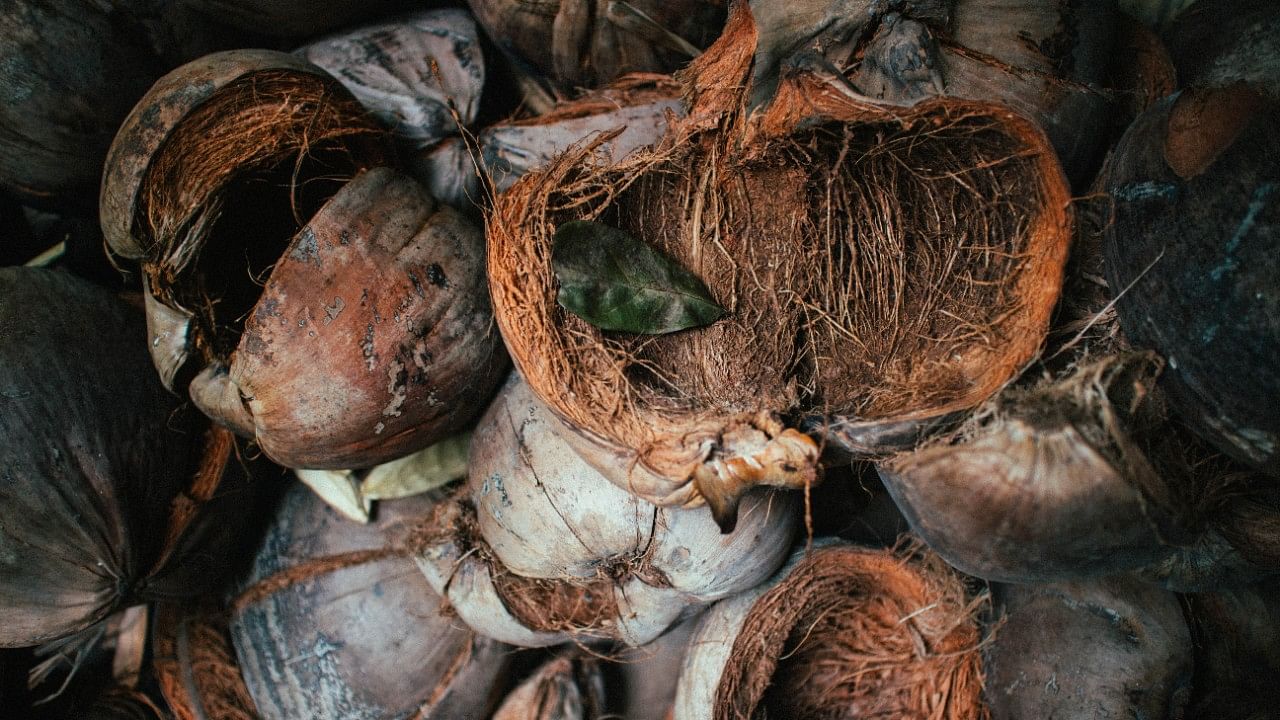
Representative image showing coconut husks.
Credit: Unsplash Photo
Thiruvananthapuram: A team of researchers from a government college here has successfully developed a groundbreaking method to produce high surface-area activated carbon suitable for supercapacitor fabrication.
This method involves deriving high-surface area activated carbon from coconut husk, which is a major agricultural residue in Kerala.
The researchers under Dr Xavier T S, Department of Physics, Government College for Women, developed the unique method, a release said here on Monday.
"Activated carbon produced in this manner utilising microwave technology is relatively inexpensive and exhibits exceptional supercapacitor capability," said Xavier.
Supercapacitors, a revolutionary technology with significantly higher capacitance and energy storage capacity than conventional capacitors, have emerged as a vital component in the quest for sustainable energy storage solutions.
Their exceptional attributes, including high power density, rapid charge-discharge capabilities, and excellent cyclic stability, make them an indispensable element in various energy storage and power management applications, such as electric vehicles and renewable energy systems, the release said.
The search for an ideal supercapacitor electrode material has been a significant challenge, necessitating eco-friendly, cost-effective, and safe solutions. In this context, coconut husk-derived activated carbon has garnered considerable attention in the field of supercapacitors, it said.
"The prototype supercapacitors made of coconut husk-derived activated carbon developed by the team are four times more efficient than existing supercapacitors," said Merin Tomy, who is part of the team.
The research team involves Merin Tomy, Ganesh S G, Anu M A, Sreelakshmi S R, and Dr Xavier T S who leveraged the innovative microwave-assisted method designed at the Centralised Common Instrumentation Facility (CCIF) at Government Women's College.
The research was published in the esteemed journal Sustainable Resource Management, a journal of the American Chemical Society. Efforts are also underway to increase its production for industrial purposes.
Moreover, ongoing research has paved the way for the potential applications of activated carbon in water purification and sensor development, underscoring its vast potential in sustainable energy storage and beyond, the release further said.
The successful development of coconut husk-derived activated carbon by the research team marks a significant breakthrough in the field of energy storage, it said.
Utilising an advanced microwave pyrolysis reactor, the team was able to produce high-quality carbon in a mere five minutes, eliminating impurities like ash and generating zero waste.
The device's high-power output, capable of powering two LEDs for 20 minutes, surpasses existing research by four times, paving the way for commercial energy storage applications, according to the release.
This achievement showcases the potential of coconut husk-derived activated carbon to revolutionise the energy storage landscape, enabling sustainable and efficient energy solutions.
The team's innovative approach and results have far-reaching implications, positioning this technology at the forefront of the quest for reliable and eco-friendly energy storage solutions.
CCIF, funded by the Government of Kerala, is the first of its kind in the state and is equipped with world-class state-of-the-art facilities, including advanced instruments like NMR spectrometer, BET analyzer, fluorimeter, Electrochemical workstation, and PCR machines.
With a vision to foster collaborative research and innovation, CCIF provides access to these world-class facilities at a reasonable service charge, ensuring that researchers from diverse institutions can leverage its capabilities.
The facility has already catered to the needs of researchers from more than 50 colleges, six universities, and six national institutes, the release added.